英语单项知识的讲解与练习(102)
- 格式:docx
- 大小:22.11 KB
- 文档页数:9
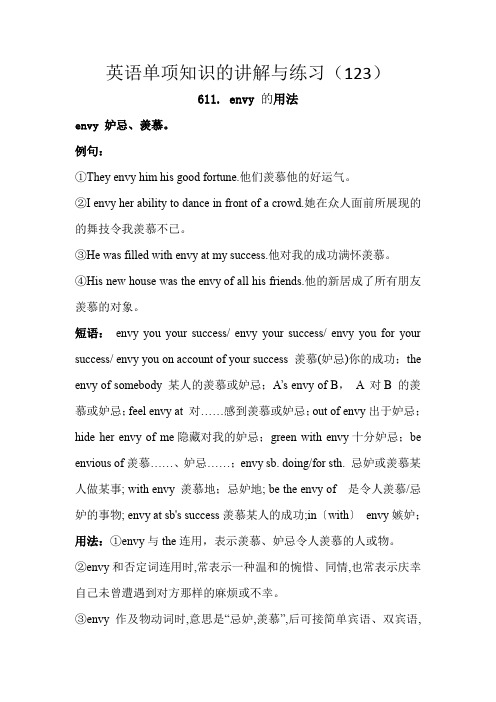
英语单项知识的讲解与练习(123)611. envy 的用法envy 妒忌、羡慕。
例句:①They envy him his good fortune.他们羡慕他的好运气。
②I envy her ability to dance in front of a crowd.她在众人面前所展现的的舞技令我羡慕不已。
③He was filled with envy at my success.他对我的成功满怀羡慕。
④His new house was the envy of all his friends.他的新居成了所有朋友羡慕的对象。
短语:envy you your success/ envy your success/ envy you for your success/ envy you on account of your success 羡慕(妒忌)你的成功;the envy of somebody 某人的羡慕或妒忌;A’s envy of B,A 对B 的羡慕或妒忌;feel envy at 对……感到羡慕或妒忌;out of envy出于妒忌;hide her envy of me隐藏对我的妒忌;green with envy十分妒忌;be envious of羡慕……、妒忌……;envy sb. doing/for sth. 忌妒或羡慕某人做某事; with envy 羡慕地;忌妒地; be the envy of 是令人羡慕/忌妒的事物; envy at sb's success 羡慕某人的成功;in〔with〕envy 嫉妒;用法:①envy与the连用,表示羡慕、妒忌令人羡慕的人或物。
②envy和否定词连用时,常表示一种温和的惋惜、同情,也常表示庆幸自己未曾遭遇到对方那样的麻烦或不幸。
③envy作及物动词时,意思是“忌妒,羡慕”,后可接简单宾语、双宾语,也可以在宾语后接for加动名词等结构,但不能接从句。

新概念英语第一册101-102课词汇学习 Word studywrite v.(1)写,书写:They are learning to read and write. 他们在学习读书写字。
She writes legibly. 她笔迹清楚。
(2)写信:I'll write to you soon. 我会尽快给你写信的。
Why didn't she write and tell him? 她为什么不写信告诉他?(3)写作;作曲;当作家:He started to write for the stage. 他开始成为一名剧作家。
He soon finished writing a symphony. 他很快就谱写成一部交响曲。
soon adv.(1)不久:It will soon be spring. 春天很快就要到了。
Soon she would have to resign. 她不久就得辞职了。
(2)早;快:Why are you leaving so soon? 你为什么这么快就要走了?He came sooner than we expected. 他来得比我们预料的快。
新概念英语第一册101-102课课后练习答案 Key to written exercises Lesson 102A1 She says she has shut the door.2 He says he has put on his coat.3 He says he has read this magazine.4 They say they have spoken to the boss.5 They say the sun has risen.B(sample sentences)1 He says he has got a cold.2 He says he feels cold.3 He says he will sell his house.4 He says he needs an X-ray.5 He says he must wait for a bus.6 He says he has got an earache.7 He says he feels thirsty.8 He says he needs a haircut.9 He says he feels ill.。
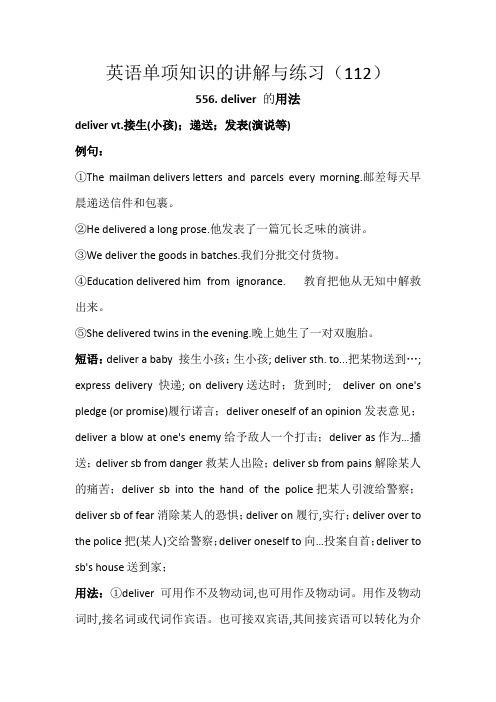
英语单项知识的讲解与练习(112)556. deliver的用法delivervt.接生(小孩);递送;发表(演说等)例句:①The mailman delivers letters and parcels every morning.邮差每天早晨递送信件和包裹。
②He delivered a long prose.他发表了一篇冗长乏味的演讲。
③We deliver the goods in batches.我们分批交付货物。
④Education delivered him from ignorance.教育把他从无知中解救出来。
⑤She delivered twins in the evening.晚上她生了一对双胞胎。
短语:deliver a baby 接生小孩;生小孩; deliver sth. to...把某物送到…; express delivery 快递; on delivery送达时;货到时; deliver on one's pledge (or promise)履行诺言;deliver oneself of an opinion发表意见;deliver a blow at one's enemy给予敌人一个打击;deliver as 作为…播送;deliver sb from danger 救某人出险;deliver sb from pains 解除某人的痛苦;deliver sb into the hand of the police 把某人引渡给警察;deliver sb of fear 消除某人的恐惧;deliver on 履行,实行;deliver over to the police 把(某人)交给警察;deliver oneself to 向…投案自首;deliver to sb's house 送到家;用法:①deliver可用作不及物动词,也可用作及物动词。
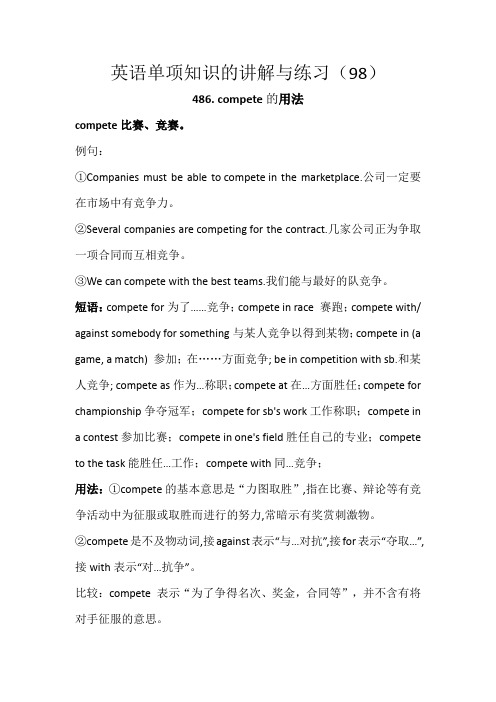
英语单项知识的讲解与练习(98)486. compete的用法compete比赛、竞赛。
例句:①Companies must be able to compete in the marketplace.公司一定要在市场中有竞争力。
②Several companies are competing for the contract.几家公司正为争取一项合同而互相竞争。
③We can compete with the best teams.我们能与最好的队竞争。
短语:compete for为了……竞争;compete in race 赛跑;compete with/ against somebody for something与某人竞争以得到某物;compete in (a game, a match) 参加;在……方面竞争; be in competition with sb.和某人竞争; compete as 作为…称职;compete at 在…方面胜任;compete for championship 争夺冠军;compete for sb's work 工作称职;compete in a contest 参加比赛;compete in one's field 胜任自己的专业;compete to the task 能胜任…工作;compete with 同…竞争;用法:①compete的基本意思是“力图取胜”,指在比赛、辩论等有竞争活动中为征服或取胜而进行的努力,常暗示有奖赏刺激物。
②compete是不及物动词,接against表示“与…对抗”,接for表示“夺取…”,接with表示“对…抗争”。
比较:compete 表示“为了争得名次、奖金,合同等”,并不含有将对手征服的意思。
contest 所表示的竞赛可以是友谊赛,也可以是有敌意的竞赛,旨在比试技能、能力、力气、耐力等,此外还可以表示赢得选举。
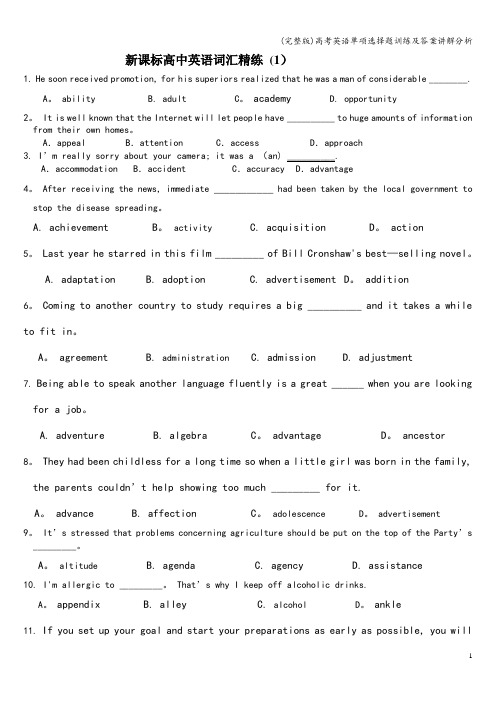
新课标高中英语词汇精练(1)1. He soon received promotion, for his superiors realized that he was a man of considerable ________.A。
ability B. adult C。
academy D. opportunity2。
It is well known that the Internet will let people have __________ to huge amounts of information from their own homes。
A.appeal B.attention C.access D.approach3. I’m really sorry about your camera; it was a (an) __________.A.accommodation B.accident C.accuracy D.advantage4。
After receiving the news, immediate ___________ had been taken by the local government to stop the disease spreading。
A. achievement B。
activity C. acquisition D。
action5。
Last year he starred in this film _________ of Bill Cronshaw's best—selling novel。
A. adaptationB. adoptionC. advertisement D。
addition6。
Coming to another country to study requires a big __________ and it takes a while to fit in。
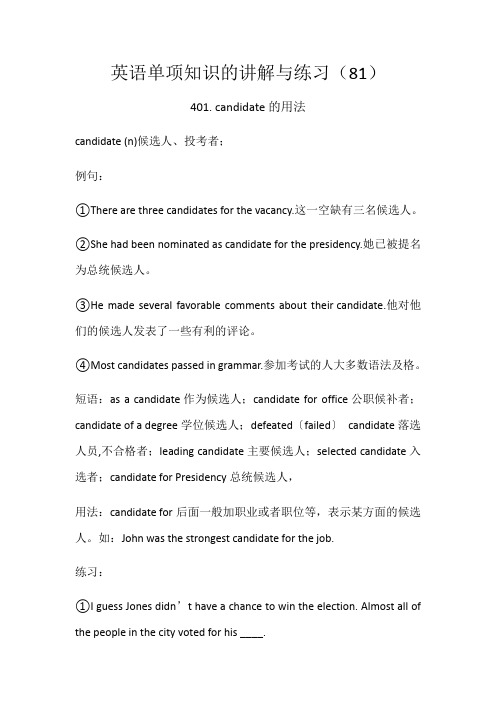
英语单项知识的讲解与练习(81)401. candidate的用法candidate (n)候选人、投考者;例句:①There are three candidates for the vacancy.这一空缺有三名候选人。
②She had been nominated as candidate for the presidency.她已被提名为总统候选人。
③He made several favorable comments about their candidate.他对他们的候选人发表了一些有利的评论。
④Most candidates passed in grammar.参加考试的人大多数语法及格。
短语:as a candidate作为候选人;candidate for office公职候补者;candidate of a degree学位候选人;defeated〔failed〕candidate落选人员,不合格者;leading candidate主要候选人;selected candidate入选者;candidate for Presidency总统候选人,用法:candidate for后面一般加职业或者职位等,表示某方面的候选人。
如:John was the strongest candidate for the job.练习:①I guess Jones didn’t have a chance to win the election. Almost all of the people in the city voted for his ____.A. opponentB. candidateC. colleagueD. advocate②They’re interviewing three _____ for the post of sales manager.A. sponsorsB. candidatesC. advocatesD. opponents③They are interviewing candidates _____ the job of sales managers.A.ofB.aboutC.forD.in④This candidate does not _____ the requirement that secondary school should be completed.A.makeB.getC.takeD.meet402. caution 的用法caution (n)小心、谨慎、警告;例句:①The teacher gave Tom a caution and told him never to do it again.老师给了汤姆一次警告,叫他不许再那样做。
初中英语语法知识点详解与习题训练英语是国际交流中最重要的语言之一,掌握好英语语法知识对于学习和运用英语来说至关重要。
在初中英语学习过程中,学生需要掌握一些基本的语法知识点,以便正确地理解和使用英语。
本文将详细介绍一些初中英语语法知识点,并提供相应的习题训练,帮助学生巩固所学知识。
一、单数和复数名词1. 单数名词是指表示一个或一种事物的名词,如“dog”(狗),“book”(书)等。
在句子中,单数名词可以和不定冠词“a”或“an”连用,表示一个或一种事物。
例句:I have a dog.(我有一只狗。
)2. 复数名词是指表示两个或两个以上事物的名词,如“dogs”(狗),“books”(书)等。
在句子中,复数名词可以和定冠词“the”连用,表示特指某些事物。
例句:The dogs are playing in the park.(狗们正在公园里玩。
)练习题:用所给名词的适当形式填空。
1. I have two ________.(apple)2. Please give me a ________.(cup)3. Do you have any ________?(brother)二、形容词的比较级和最高级1. 形容词的比较级用来比较两个人或物的大小、高低、速度等。
规则变化:形容词的比较级通常在词尾加“er”,如“bigger”(更大的),“faster”(更快的)等。
2. 形容词的最高级用来表示三个或三个以上人或物中最大、最高、最快等。
规则变化:形容词的最高级通常在词尾加“est”,如“biggest”(最大的),“fastest”(最快的)等。
练习题:选择合适的词填入句子中。
1. Lucy is ________ than Lily.(tall)2. The elephant is ________ animal in the world.(big)3. This car is ________ than that one.(fast)三、动词的时态1. 现在时态用于描述当前正在发生的事情或经常发生的事情。
英语单项知识的讲解与练习(120)596. earn的用法earnvt. 赚;挣得;获利;赢得;获得例句:①He has earned a lot of money in this month.这个月他已经赚了好多钱了。
②He works hard, but he does not earn much money.他工作很努力,但钱赚得不多。
③How does she earn her living?她靠什么谋生?④His skill in negotiating earned him a reputation as a shrewd tactician.他的谈判技巧使他赢得了精明战略家的名声。
⑤It has taken years to earn their trust.花了好多年才赢得他们的信任。
短语:earn one’s living=make a living 谋生; earn money= make money 挣钱; earn a good reputation 赢得一个好名声; earn sb. sth赢得某人某物;earn by 用…博得;earn by hard labour 靠辛勤劳动挣来的;earn by sweat and toil 靠血汗而挣得的;earn for sb 为某人博得;earn with 用…挣得;用法:①earn可用作及物动词,也可用作不及物动词。
用作及物动词时接名词或代词作宾语。
②earn作“使得到,使赢得”解时,其后还可跟双宾语,其间接宾语也可转化为介词for的宾语。
辨析: earn 侧重指依靠自己的劳动或因付出代价,有功而获得。
obtain 着重指通过巨大努力、要求得到所需或盼望已久的东西。
acquire书面用语,强调通过不断地、持续地努力而获得某物,也指日积月累地获得。
get一般用语,使用较广。
可指以任何方式得到某物,也不一定要经过努力。
gain侧重指经过努力或有意识的行动而取得某种成就,或指获得某种利益或好处。
餐厅TINA: Can we(9-96-16)have a table for 2, please?请为我们安排一张2人桌,好吗?BELLY: Sorry, all (1-14-14)the tables for 2 are reserved.抱歉,2人桌被订完了。
TINA: Do(32-1)you have a table for 3, please?有3人桌吗?BELLY: Yes, smoking or non-smoking?有,吸烟区还是非吸烟区?TINA: We'd like a non-smoking table, please.我要不吸烟区的桌位。
BELLY: Come with me, please(20-205-1).请跟我来。
BELLY: Would you like to order now,(9-96-45)madam?女士,想好要吃什么了吗?TINA: Yes, please. I'd like the steak and mushrooms.是的,请给我来一份牛排和蘑菇。
BELLY:: How would you like your steak, rare, medium, or well-done?牛排要三分熟,五分熟还是全熟?TINA: I'd like it well done,please.我要全熟的。
BELLY: What kind of(5-54-2)potatoes would like to go with that, mashed, boiled, or baked?配的土豆要土豆泥,煮的还是烤的?TINA: I think I have bake potatoes.(159-1)And i now have a ice tea with lemon on the side, please.要烤土豆。
我还要一杯配一片柠檬的冰茶。
Lesson97~102句型及短语1、leave“遗忘,丢下”通常可与表示地点的短语连用。
句型:leave sth + some place(某地)如:I left my glasses in the library. 我把眼镜忘在图书馆里了。
句型:forget sth“头脑中忘记了”如:I forgot to tell you who I am。
我忘了告诉你我是谁。
2、the other day表示“几天前”。
the other +表示时间的名词通常只与过去时态连用。
类似的短语有:the other morning/afternoon/evening/night(几天前上午/下午/晚上/夜里),the other week/ month/ year(几周/月/年前)。
3、There's a label on the handle with my name and address on it. 箱把上有一标签,上面写着我的姓名和住址。
句中介词with在这里可理解为“有”的意思。
4.fifty pence, 50 便士。
pence是penny(便士)的复数形式,表示币值。
5、belong to +人/物“属于某人或某物”That pen belongs to him.那只笔是他的。
Which party does he belong to?他是哪个党的党员?6、What’s the matter?=what’s wrong (with you)?=what’s the trouble?你怎么了?(交际用语中经常用到)7、写地点时一般是由小到大的顺序。
如:83,Xinhua Road Pingdingshan City Henan Province。
8、get up,站起来。
这一短语还可表示“起床”。
9、be afraid that,担心,恐怕;be sure that, 肯定,确信,认为。
英语单项知识的讲解与练习(102)506. consist的用法consist由……组成、构成、在于。
例句:①The United Kingdom consists of Great Britain and Northern Ireland.联合王国由大不列颠和北爱尔兰组成。
②How many players does a baseball team consist of?棒球队由几名队员组成?③Matters consist of molecules, and molecules of atoms.物质由分子构成,而分子由原子构成。
④Health does not consist with intemperance.健康和酗酒不能相容。
⑤The report does not consist with the fact.那报导与事实不合。
短语:consist in 在于、存在于;consist with并存、一致;consist of/ be made up of由……组成;consist in the absence of obstructions 主要在于没有各种障碍;consist of 由…组成〔构成〕;consist of hot tea or coffee 包括热茶或咖啡;consist with the facts 符合事实;consist with sb's words 言行不一致;用法:①consist的基本意思是“某物由…组成”,是不及物动词。
其后常接of短语表示其构成情况,且只用于一般时态,不用于进行体和完成体,也不用于被动结构。
②consist还常与in, with连用。
与in连用表示“以…为要素”“主要在于”; 与with连用表示“和…一致”“并存”。
③consist后面可接复数名词或单数名词,其含义不同。
接复数名词时,意为“由…组成”; 所接的单数名词为复数含义时,意为“由…组成”; 所接的单数名词是主语所表达事物的一部分时,意为“有”“含有”; 所接的单数名词是主语所表达事物的全部时,意为“是,就是”; 所接的单数名词后面有后置定语(短语〔从句〕)时,意为“由…构成”。
练习:①The United Kingdom ___ Great Britain and Northern Ireland.A. makes upB. composesC. consists ofD. was made up of②The opening province which ___ 13 countries and 3 coastal cities will quicken its paces of economic development.A. consists ofB. makes upC. is includedD. is contained③Dreaming without hard work will never ___ anything.A. burst intoB. consist ofC. amount toD. set aside④What we need is a mixture ___ flour and water.A. consisting ofB. making ofC. making fromD. making up of507. contact的用法contact接触、联系。
例句:①The rich secluded themselves from contact with the poor.富人不肯同穷人接触。
②She has a contact in the software industry.她在软件行业有个熟人。
③Contact the police at once!立刻与警方联系!④Our patrols on all our fronts contacted no enemy today.今天我方在各条战线上的巡逻队均未遭遇敌人。
⑤She suffers from a contact skin rash.她患上了一种接触传染性皮疹。
短语:be in/ out of/ lose contact with和……保持(失去)联系;get in contact with与……取得联络;make contact with与……联络;keep in contact with与……保持联系;come into contact with与……接触;contact sb about sth 与某人联系某事;contact sb by telephone 用电话联系某人;contact between teacher and student 老师和学生之间的接触;用法:①contact作名词时,既可作单数,也可作复数。
英国人习惯用其单数形式,而美国人则习惯用其复数形式,表示“联系”的意思。
如:I have had many contacts with my friends.②contact作动词时,指“与……联系”。
如:During my stay in the city I contacted several teachers.③contact可用作不及物动词,也可用作及物动词,用作及物动词时接名词或代词作宾语,可用于被动结构。
练习:①I come into ___ with all kinds of people in my work.A. contractB. attackC. attractD. contact②The ___ of the earthquake was 200 kms away from Tianjin, but the people of the city could still feel the earthquake.A. bowB. placeC. contactD. focus③In dealing with public relations, we should make efforts to prevent the ___ in personality.A. contactB. contrastC. connectionD. conflict④He ___ contact with his mother many years and last month he ___ her at last.A. was out of, got in contact withB. lost, got in touch withC. A and BD. was in, got in contact with508. contain 的用法contain 包含、容纳。
例句:①The atlas contains forty maps.这个地图集有四十幅地图。
②Does each cup contain the same amount of milk?每个杯子里的牛奶都一样多吗?③This book contains all the information you need.这本书包含你所需的一切资料。
④She couldn't contain herself for joy.她高兴地难以自制。
短语:couldn’t contain oneself for joy 高兴得不能自制;Ten contain five and two十可被五和二除尽;contain between sth 包容在某物中间;contain by the lines AB and AC 由直线AB和AC构成;contain in premises 隐含于前提;contain in the report 写进该报告中;用法:①contain的基本意思是“包含”“容纳”,表示实际包含着某一部分或成分。
引申可表示“抑制”“控制”等。
②contain是及物动词,接名词或代词作宾语。
表示“所属”“构成”关系时,不能用于进行体,不能用于被动结构,也不可用过去分词作定语; 作“控制,抑制”解时,多用于否定句或疑问句,其后接介词for〔with〕+高兴〔气愤〕等名词,也可指大小便“憋不住,忍不住”。
③contain有时还可表示“作…的边”“可被…除尽〔整除〕”解。
比较:contain指“包含的是全体”,而include包含的是部分,包括在内作为整体的一部分。
如:This book contains 40 maps, including three of Great Britain.contain是指“实际装进了、容纳了的量而言”,而hold是指本身的“实际容量或容纳能力而言”。
如:The bottle contains several ounces of liquid, but it holds a quart.练习:①This atlas ___ 40 maps, ___ 3 of the Great Britain.A. contains; includingB. includes; containingC. contains; containingD. includes; including②At least 20 people were injured in the car accident, three children ___.A. containedB. includingC. were includedD. included③Why is seawater unfit ___? Because of the large quantities of salt ___ in seawater.A. to drink; containedB. to be drunk; containedC. for drinking; is containedD. for being drunk; containing④This textbook ___ 10 units in all, ___ two mainly revisions.A. includes; containingB. contains; includingC. contains; containingD. includes; including⑤Those old pots, ___ the one with a flying dragon on it, ___ 32000 Chinese ancient coins.A. included; includeB. containing; containC. including; containD. including; include⑥Vegetables like tomatoes ___ rich vitamins. They are good for our health.A. containB. containsC. includeD. includes509. entrance的用法entrance n.入口, 门口, 进入;例句:①There is an entrance just around the corner.拐角处有个入口。